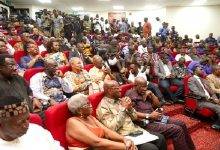
|
The former Executive
Director of International Federation of Women Lawyers-Ghana (FIDA-Ghana),
Glory Ofori-Boadu, has tasked political parties desirous of contesting the
2020 general elections to adopt a comprehensive approach to increase women’s
participation in leadership and decision making. She explained that ” the 2020 elections offers political parties especially the New Patriotic Party (NPP) and the National Democratic Congress (NDC) the opportunity to demonstrate determination, dedication and commitment to gender empowerment through providing the needed support and assistance towards capacity building, training, and gender equality structures. “In the spirit of Beijing Declaration and Platform for Action, NPP and NDC, in particular, must set reinvigorated targets to ensure women win appreciable parliamentary seats to occupy their rightful positions in leadership and decision making, in 2015, we adopted the ‘Ghana Agenda 2030’, which is a 15-year gender empowerment project with checklist to serve as benchmark for measuring results by 2030. “We sought through the Ghana Agenda 2030, to ensure women occupied 60 per cent of ministerial portfolios, especially finance, energy, education and health, women should also take about 60 per cent of positions of state corporation chief executive officers, Ghana Club 100 chief executive officers and bank chief executive officers. “Ghana Agenda 2030 developed under the guidance of Nana Oye Lithur, former Minister of Gender, Children and Social Protection, emanated from United Nations (UN) Women Agenda 2030, also called for measures to ensure 50 per cent of Vice Chancellors and University Professors must be women,” Ms Ofori-Boadu noted. Aspiring to represent the chiefs and people of Abuakwa South Constituency in the Eastern Region in Parliament, on the ticket of NPP, she revealed that the Ghana Women 2030 target also aimed at 60 per cent of parliamentary seats, 60 per cent of metropolitan, municipal and district chief executive positions and 60 per cent of assembly and unit committee members. “The persistence of discrimination, gender bias, threat of violence, harassment, and intimidation in political institutions, contribute to low level of women’s political participation, accelerating women’s participation in decision making required comprehensive approach, implementation of temporary special measures to achieve gender balance in decision making bodies, capacity building and training initiatives to support and assist women’s political participation at the local and national levels,” Ms Ofori-Boadu observed. She is contesting Samuel Atta-Akyea, as the incumbent Member of Parliament since 2008. -GNA |





